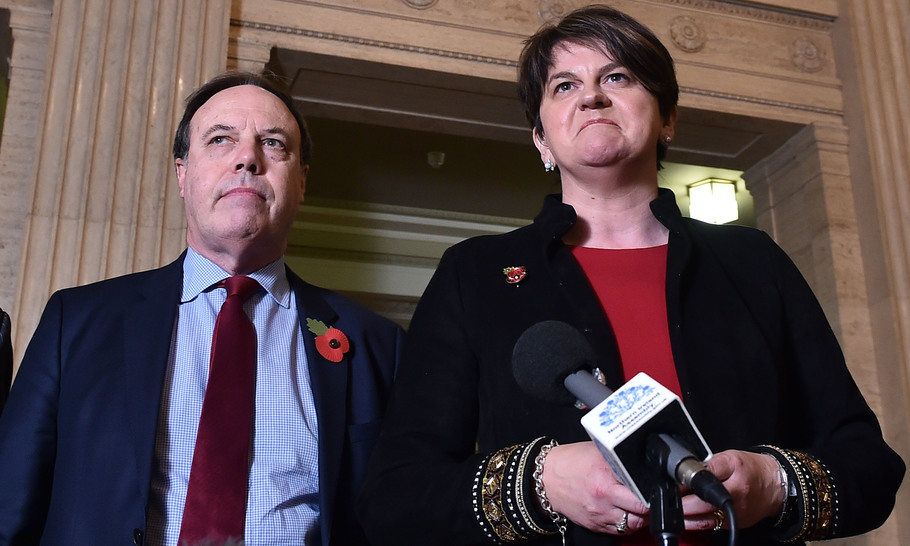Theresa May never bothered to understand the DUP. Now she's reaping the consequences.

Charles McQuillan/Getty Images
When an ashen-faced Theresa May and her advisers met on the morning of 9th June 2017, it didn’t take them long to decide on a way forward. The car-crash of an election, in which the Conservative Party lost its wafer-thin majority, had been bruising, yes, but no bones had been broken. If given the right financial incentives, the thinking went, DUP MPs would happily step in to help their Brexiteer, Unionist cousins on the other side of the Irish sea. After all, the two parties shared roughly the same aims.
Of course, the young special advisers will have reminded themselves, the motley army of DUP MPs with their old fashioned views on homosexuality and abortion may not make the best bedfellows. But like the quaint, elderly Conservative MPs of the Home Counties who shared such views, they would surely gracefully concede ground to a younger, more thrusting generation if given a proper nudge.
18 months on from the general election, and it is clear that May and her advisers massively underestimated Arlene Foster and her tribe. The 10 MP strong party which was supposed to acquiesce to its English partner has robustly expressed profound dissatisfaction with May’s deal at every opportunity, and now, in a “warning” to May, it has failed to back the government on several of amendments to its Finance Bill. If Theresa May is not replaced, Chief Whip Jeffrey Donaldson threatened last Friday, the DUP may well withdraw its support altogether.
So, how could the Prime Minister have got it so wrong? And why has the DUP turned against her personally? The answer to both is simple: the Prime Minister never took the time to understand who the DUP were, were they came from, or the nature of their very specific take on Unionism – and it is now coming back to bite her.
***
When English children are taught about the origins of The Troubles, they are taught about a contest between two sides: pro-Irish Catholic nationalists and pro-British Protestant Unionists. In fact, as Newton Emerson explains in this piece for Foreign Policy magazine, there were three traditions jostling on the disputed ground of Ulster: the Irish, the English, and the Scots. The Presbyterian Scots, the antecedents of the DUP, may have shared the cause of Unionism with their English counterparts, but culturally, the two sides had very little in common.
“It was an epic miscalculation. Arlene Foster and her fellow DUP MPs don’t care about economic deals, and unlike the English Conservative Party, they’re not beholden to business.”
The English Anglicans were bourgeois, establishment types who saw the unity of Great Britain and Northern Ireland as sensible, while the working class Scots, descendants of ‘dissenters’ looked on the establishment with disdain, but felt the cause of unionism in their very bones. At the end of the 18th Century, the two groups joined forces and the province of Northern Ireland was formed – but the cultural differences remained deeply ingrained.
Arlene Foster and Theresa May, both staunch Unionists, epitomise those differences. Foster, whose party was founded by a firebrand Presbyterian, the late Ian Paisley, grew up on a farm in rural Roselea, and had her first experience of the Troubles when a night-time attempt was made to kill her father, a Royal Ulster Constabulary reservist. Theresa May, the daughter of an English vicar, spent her childhood sipping tea in a home counties village. As May was developing into a pragmatic, technocratic Conservative with a genteel love for the United Kingdom, Foster was learning the hard way that the unionist cause is fuelled by blood.
***
When the Prime Minister pitched her Brexit deal to the DUP last week, she must have believed that with a bit of convincing, they would vote for it. Economically, she will have reasoned, the deal is good for Northern Ireland, which would be able to trade freely with both the UK and the EU. Even if Foster and her tribe opposed it initially, it seemed likely to her that Northern Irish business leaders (Unionists and DUP voters themselves, in the main) would back it – and then surely, it would only be a matter of time before the Irish politicians saw sense.
It was an epic miscalculation. Arlene Foster and her fellow DUP MPs don’t care about economic deals, and unlike the English Conservative Party, they’re not beholden to business. Their raison d’etre is to keep Northern Ireland in the United Kingdom, and they will do everything in their power to prevent its break-up. Under no circumstances would they ever accept a deal which handed any power at all over from London to Brussels, and if the alternative is invoking the wrath of business in a no-deal Brexit, they can live with that. In short, they are Unionists to their very core, and they will risk everything to stay that way.
If the ultra-Leavers of the ERG never manage to produce the 48 letters of no confidence needed to trigger a vote of no confidence in the Prime Minister, then May will stagger on for a while longer. But without the support of the DUP – as last night’s vote proved – she will be unable to pass any serious legislation, and sooner rather than later her government will crumble.
If May had taken the time to get to know her Northern Irish counterpart and understand her background, she may well have seen problems on the horizon long before now and managed to avert this crisis. Instead, she has shrugged off Arlene Foster like an embarrassing aunt, and projected her own, very English brand of unionism onto the DUP. She and the Tories are now reaping the consequences.





